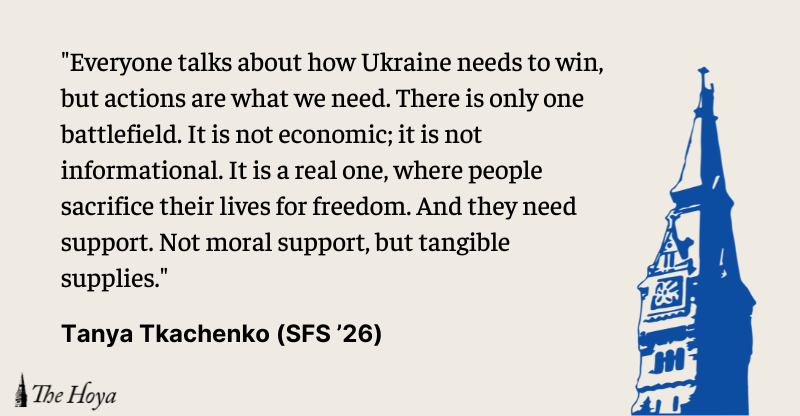On Feb. 24, 2022, I woke up to the sound of explosions in Lozova in the Kharkiv region of Ukraine. “The war has begun” were the first words I heard that morning as my mom rushed to the military office where she works. Growing up in a military family in the eastern part of Ukraine, I was not afraid of war. But I did not realize this time was different.
For many foreigners, the war in Ukraine became a major issue a year ago. For many Ukrainians, however, it started in 2014 with Russia’s annexation of Crimea and the Donbas region. Many brave people — including my parents and my brother, who is now a prisoner of war — fought over the course of those nine years to protect Ukraine’s sovereignty and freedom.
Georgetown University has made admirable efforts to support me and my country, but I believe that what Ukraine actually needs right now goes far beyond class discussions. My personal experience makes me recognize that we must focus on more tangible necessities, such as ammunition, fundraising and supplies for soldiers in Ukraine.
Coming to Georgetown in August was probably not as exciting for me as it was for many other students. I had mixed feelings about achieving my biggest dream and leaving my home country during the war. My family, friends, mentors and the Georgetown administration were very supportive during my transition into the community and helped me follow my educational dreams, but it has still been hard for me to focus on school when the only thing on my mind is how to help my country and my family.
In my courses in the School of Foreign Service (SFS), the war in Ukraine is discussed in almost every class. Sometimes, I have to step back in the discussion, as it is hard to stay unbiased when students discuss the similarity between Ukrainian and Russian cultures or the rationality of the occupants’ actions. My professors, however, are very supportive, and I appreciate how they present such sensitive topics. As for the Georgetown community in general, I can see that students are trying to learn more about Ukraine and the ongoing war; they are constantly curious about the historical context and modern-day experiences of the Ukrainian people.
As an Eastern European student at Georgetown, I have been exposed to many gaps between my culture and Western culture. It has been a fascinating experience as an international student, but being “the Ukrainian girl” sometimes makes it even harder for me to adapt.
I am not uncomfortable talking about the war like some of my Georgetown friends are, largely because I grew up hearing all the different stories of people affected by war in 2014, such as deceased soldiers and refugees from Donetsk and Luhansk. For me, it has been like this for most of my life. But I did not realize how it can sometimes be difficult to speak about it with people who barely know about these events.
When I meet people for the first time, they are always surprised when I say I am from Ukraine. They start awkwardly asking me questions in an effort to be polite, and the whole conversation turns into a discussion about the war and politics where I have to explain the history of Ukraine’s centuries-long fight for independence in just a few minutes. The history is especially relevant to the classes I take and the SFS in general, as students here are very curious about politics, but I’ve found that they are often unfamiliar with the history of Eastern Europe.
Washington, D.C.’s response to the war has impressed me, though. I know the Ukrainian community here is enormous, and it is always heartwarming to see Ukrainian flags as I walk by buildings or attend Ukrainian events. On campus, Georgetown is also trying to highlight the events in Ukraine; I’ve noticed that the university has been hosting many guest speakers who come to campus to discuss the war, professors have been mentioning it often during classes and the administration has shown support for the efforts of Ukrainian students. For Ukraine, this is all a sign of support, and we are grateful for that.
On this issue, however, the Georgetown community can still do more. One of the ways to help would be to connect with the nonprofit organization Razom for Ukraine, which helps organize various advocacy events and fundraisers for helmets, armory vests and other supplies. Community members can also find more information about the ways to help at the official government website UNITED24, join daily rallies near the White House and share news about Ukraine on social media. It’s been a year already, and we need to finish this.
Everyone talks about how Ukraine needs to win, but actions are what we need. There is only one battlefield. It is not economic; it is not informational. It is a real one, where people sacrifice their lives for freedom. And they need support. Not moral support, but tangible supplies.
Tanya Tkachenko is a first-year in the School of Foreign Service.















Charlie Ginsburg • Mar 3, 2023 at 5:48 pm
You deserve all the military supplies that you need in order to push the Russians out of your country. George Washington got enormous military help from the French and that enabled George Washington to create America. Vladimir Zelensky must receive enormous military help from the West. Just as the Americans showed deep courage your people are showing deep courage. Your soldiers are so brave that they have become role models for the entire free world. Glory to Ukraine!